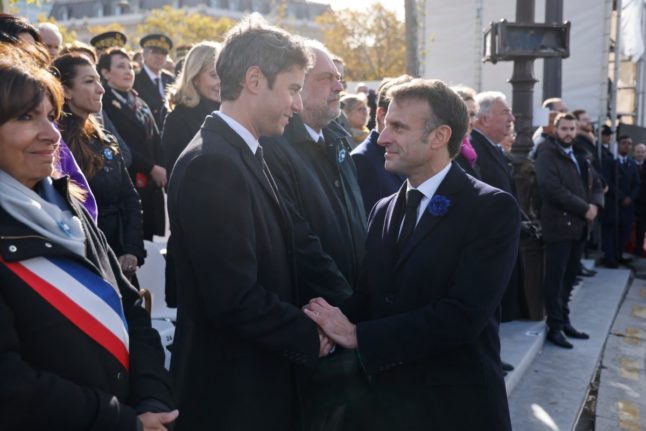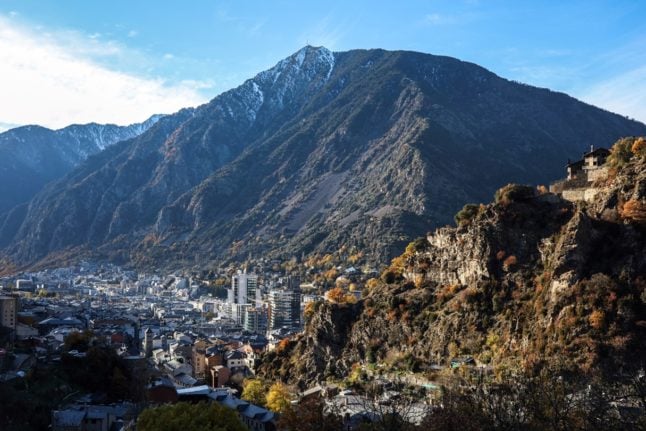Emmanuel Macron risks becoming an old man at the age of 46.
By appointing a 34-year-old prime minister, he has taken a double gamble.
READ MORE: Gabriel Attal: Five things to know about France’s new prime minister
Gabriel Attal, promoted to PM on Tuesday after only five months as education minister, may fail and sink the last three years of Macron’s second term.
Alternatively, he might succeed and make the president look like yesterday’s man.
Macron’s three previous prime ministers have been much older than him, something unheard of in the Fifth Republic. They were more technocratic than political. When the first, Edouard Phillippe (2017-2020) made the mistake of becoming more popular than the president, he was fired.
Attal is a completely different proposition. He is not a technocrat. He is a naturally talented politician – perhaps the most naturally talented French politician since François Mitterrand or Jacques Chirac.
He is far more popular than the president, jostling Edouard Philippe for top position in the approval table of French politicians. In his lightning career as education minister, Attal has succeeded where Macron has mostly failed.
He has not only done things (banning Islamic robes in secular state schools; taking action against bullying), he has created a narrative of rapid action and success.
Macron has had many successes (and many failures) since 2017 but he has always struggled to sell a clear narrative of progress to the French people.
Why take this punt on Attal? The choice has evidently infuriated several of Macron’s leading centrist barons. The sulking “oldies” this week include Bruno Le Maire, 54, the long serving finance minister, who was Attal’s boss until five months ago.
They also include ex-PM Edouard Philippe, 53, who sees Attal as the greatest threat to his hopes of succeeding Macron as champion of the Centre – and President of the Republic – in 2027.
Sacking Elisabeth Borne on Monday was an inevitable act of ingratitude. In her 20 months as PM, she has been Macron’s faithful warrior, pushing through the two largest and most difficult reforms – pensions and migration – promised by the president in his 2022 re-election campaign.
The price has been lengthy strikes, riots, a constitutional crisis, a split in Macron’s centrist coalition, a collapse of the president’s approval ratings and the insolent polling strength of the Far Right and Marine Le Pen.
But this was Macron’s strategy, not Borne’s. Like him, she proved unable to convince a large section of public opinion that the reforms were necessary (as they were).
Macron has evidently decided that this brutal, take-the-medicine phase of his presidency career is over. He wants, in the three years that remain, to move on to a new reform agenda which will, he hopes, be more appealing to a broad range of French people.
He calls this “civic and social re-armament” or “social and industrial regeneration”. What exactly this involves is unclear.
It aims to address the weaknesses and fault lines in French society and democracy revealed by, inter alia, the Gilets Jaunes revolt in 2018-9, the urban and suburban riots last summer and the polling strength of Le Pen.
We know, so far, that it will involve wider experiments in school uniforms and a changed school curriculum to inculcate a better understanding of democracy, secularism and the European Union.
There will also be new economic proposals to boost the re-industralisation of France, which Macron has has already begun, and to rescue his threatened promise of full employment by 2027.
READ MORE: How ‘Battery Valley’ is changing northern France
On the whole, however, there will be no more crisis-inducing, full-frontal reforms like the increase in the pension age to 64. Much of the “civic re-armament” agenda does not even need legislation.
In part, this is an admission of weakness. Macron no longer has the stomach for – or sees the sense in – forcing controversial legislation through parliament without an overall majority.
A senior Elysée official told Le Monde today that Macron thinks the time has come to “end a cycle” and “repair the nation”.
The official continued: “He wants to introduce a semi-colon, a pause, in his decade in power, by changing key as you might in a piece of music or a poem”.
A poem, no less.
In more prosaic words. Attal has been chosen for his narrative skills as a politician – his ability to do stuff that people want while telling them that he is doing it.
Macron’s people have long argued that they have obtained little credit for their achievements, ranging from a sharp reduction in unemployment to a substantial reduction in greenhouse-gas emissions.
The president hopes that the next three years will be the opposite. Little of substance will be done but the new PM will sell a series of softer, atmospheric reforms and a story of success to the French people.
Attal’s first job will be to become the new, dynamic, pugnacious, telegenic face of Macronism in time to reduce the Far Right’s runaway polling lead in the European elections in June. If he succeeds, Macron can spend his final three years in the Elysée as the kind of aloof, elder statesman and father of the nation that Charles de Gaulle originally intended.
That, anyway, is the theory. Everything in Attal’s short career so far has succeeded beyond reasonable expectation. He may prove to be an inspired choice.
But the Matignon, the home and office of French prime ministers, is a graveyard of political ambitions. It is an impossible, managerial job in which the PM has to manoeuvre between the egos of his ministers and the tyranny of what Harold McMillan called “events, dear boy, events”.
No prime minister in the Fifth Republic, save De Gaulle himself, has gone on directly to be president. Only a couple of them, Chirac and Georges Pompidou, have made the transition at all.
Attal now becomes overnight the joint favourite with Edouard Philippe to emerge as Macron’s successor as leader of the reformist, pro-European centre in 2027. But the career of the previous “youngest ever, French PM”, Laurent Fabius (1984-6) never recovered from his time at Matignon.
Macron has handed Gabriel Attal a huge opportunity; and also a curse.



 Please whitelist us to continue reading.
Please whitelist us to continue reading.
Could this strategy not be looked at as a golden opportunity to, à la fois, gild Macron’s legacy as he finishes his mandates, while ensuring that Edouard Philippe be elected as his successor? I would be surprised to see someone as young as Attal be elected President (in 3 years he’ll be about 37). If Attal is even reasonably successful, it could be a winning strategy for the entire Center of French politics.
…. in 2008, Attal was cast by his film producer father Yves as a schoolboy in La Belle Personne, a César-nominated teen comedy starring Léa Seydoux, who went on to play Daniel Craig’s love interest in Spectre and No Time to Die. The film may have been of interest to Macron, who has long pushed Attal as his protégé, since the plot involves a forbidden romance between a teacher and their pupil, a subject of which the president has personal knowledge.